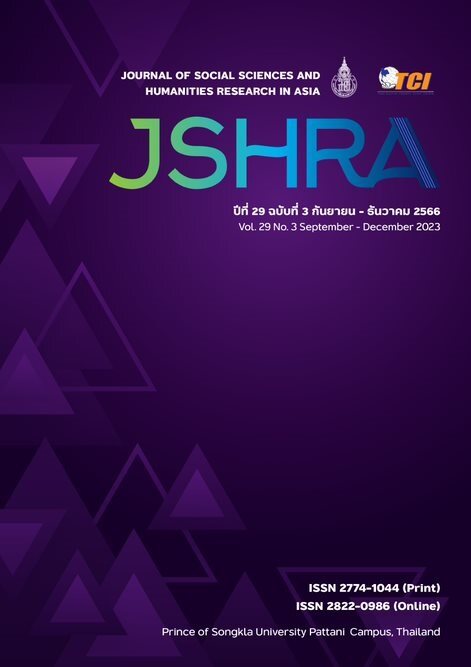The Digital Citizenship Behavior for Disruptive Era of the Elderly in Thailand
Keywords:
Behaviors, Digital Citizenship, Disruptive Era, ElderlyAbstract
The research aimed to achieve two main objectives: 1) examine the digital citizenship behaviors of the elderly in the disruptive era, and 2) assess the requirements for enhancing digital citizenship among the elderly in Thailand during this disruptive era. Employing a mixedmethod approach, the study surveyed 400 individuals aged 60 and above, affiliated with elderly schools nationwide, and conducted 50 in-depth interviews with elderly participants. Data collection involved questionnaires and interviews, with analysis employing techniques such as
frequency, ratio, means, standard deviations, Priority Need Index (PNI Modified), and content analysis. The findings revealed that 96.90% of the elderly primarily utilised smartphones, accessing digital media through personal internet connections at a rate of 93.50%. About 27.40%
reported daily internet usage for 1 - 3 hours, with 85.30% using digital tools for communication with family and friends. The LINE application emerged as the most popular social media platform at 78.6%. The predominant challenge faced was slow internet connectivity, reported by 52.50% of participants. Regarding the needs assessment for advancing digital citizenship among the elderly in the disruptive era, three key requirements were identified. Foremost was the necessity for support from family and the community to communicate and share knowledge about healthy nutrition online (PNI Modified = 2.30). Subsequently, the crucial need for knowledge and
skills in utilizing digital tools to enhance daily life convenience and problem-solving was underscored (PNI Modified = 1.87). Lastly, the importance of managing misinformation or fake news and verifying information before belief and online sharing was emphasized as necessary (PNI Modified = 1.77).
References
Areekul, C. (2020). Education and lifelong learning: Concepts, principles and essentials. Bangkok: Chulalongkorn University Press.
Bandura, A., & Walters, R.H. (1963). Social learning and personality development. Holt Rinehart and Winston: New York.
Bernabé-Valero, G., Iborra-Marmolejo, I., Beneyto-Arrojo, M. J., & Senent-Capuz, N. (2018). The moderating role of intellectual humility in the adoption of ICT: A study across life-span. Frontiers in Psychology, 9, 2433. https://doi.org/10.3389/fpsyg.2018.02433
CEDARAFRICA. (2022). Steps to implementing culture change in an agile/VUCA world. Retrieved January 2, 2022, from https://cedarafricagroup.com/culture-change-in-an-agile-world/
Chotjirawatthana, S., Tantrarungroj, P., & Suwanmonkma, S. (2020). The needs assessment of information and communication technology to support health literacy in the learning center for the elderly in Bangkok and its vicinities. Library Science SWU Journal, 12(2), 71 - 85.
Department of Older Persons. (2021). Register of elderly schools. Retrieved November 25, 2021, from https://www.dop.go.th/thai/service_information/1/14
Department of Older Persons. (2022). Elderly statistics. Retrieved January 25, 2023, from https://www.dop.go.th/th/know/side/1/1/1962
Electronic Transactions Development Agency. (2019). Thailand internet user behavior 2019. Bangkok: Ministry of Digital Economy and Society.
Electronic Transactions Development Agency. (2022). Thailand internet user behavior 2022. Bangkok: Ministry of Digital Economy and Society.
Foundation of Thai Gerontology Research and Development Institute. (2018). Situation of the Thai elderly 2018. Bangkok: Foundation of Thai Gerontology Research and Development Institute.
Foundation of Thai Gerontology Research and Development Institute. (2021). Situation of the Thai elderly 2021. Bangkok: Foundation of Thai Gerontology Research and Development Institute.
Kowtakul, S. (2011). Educational psychology. Bangkok: Chulalongkorn University Press.
Khlaisang, J. (2017). Systematic Production and Use of Media for Learning in the 21st Century. Bangkok: Chulalongkorn University Press.
Kleechaya, P. (2021). Digital technology utilization of elderly and framework for promoting Thai active and productive aging. Journal of Communication Arts, 39(2), 56 - 77.
Moret-Tatay, C., & Murphy, M. (2019). Aging in the digital era. Front. Frontiers in Psychology Science, 10, 1815. https://doi.org/10.3389/fpsyg.2019.01815
Rodkhem, R., & Chaiprasit, S. (2019). Ageing society: Technology and the elderly. EAU Heritage. Journal Science and Technology, 13(2), 36 - 45.
Ratanaubon, A. (2016). Learning of adults and elderly in Thai society. Bangkok: Chulalongkorn University Press.
Robin, N. (2022). Lifelong learning - upskill with SITizens learning credits. Retrieved May 24, 2022, from https://www.singaporetech.edu.sg/
Ribble, M. (2017). Digital citizenship: Using technology appropriately. Retrieved June 24, 2022, from http://www.digitalcitizenship.net/
Samithkai, C. (2021). Social psychology (2nd ed.). Bangkok: Chulalongkorn University Press.
Sap-in, R., & Khaoroptham, Y. (2017). The elderly and media in Thailand. Journal of Communication Art Dhurakij Pundit, 11(2), 367 - 387.
Siemens, G. (2004). Connectivism: A learning theory for the digital age. Retrieved August 17, 2023, from http://www.elearnspace.org/Aricles/Connectivism.htm
Wongwanich, S. (2019). Needs Assessment (4th ed.). Bangkok: Chulalongkorn University Press.
Yap, Y.Y., Tan, S.H., & Choon, S.W. (2022). Elderly’s intention to use technologies: A systematic literature review. Heliyon. 8. e08765. https://doi.org/10.1016/j.heliyon.2022.e08765










